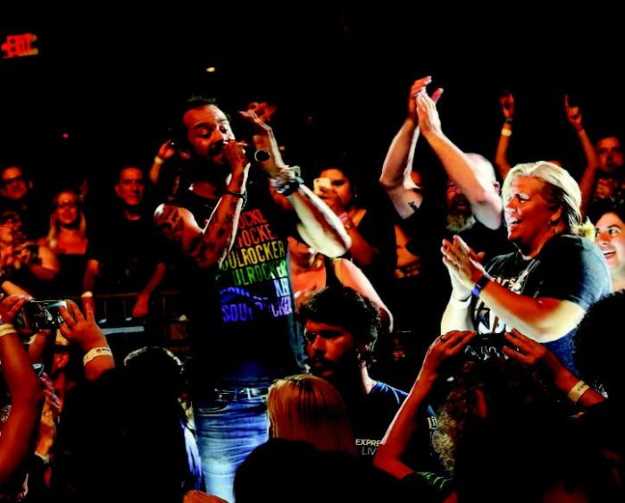|
Taken from Relix (Apr 23, 2019)
"The Sweetest Thing": Michael Franti, U2 and Song Reception
by Dean Budnick

Michael Franti in the crowd. Photo by John Patrick Gatta |
I've had lyrics on my mind as of late.
In Jeff Tweedy's intimate and moving memoir, Let's Go (So We Can Get Back), he describes a songwriting goal at one point in his career when he aspired to "find a balance in between leaving enough room for someone to pour themselves into a song and giving them something concrete and engaging enough to want to be intimately collaborating with you on the meaning." Tweedy cites "You Are My Sunshine" as a paragon, noting, "Most people think of that song as being simple and easily understood, but I don't know anyone who agrees exactly on what it means."
I wholeheartedly concur. I imagine you have some vague sense of what that song is about, which is likely a product of the first few lines. However, go listen to "You Are My Sunshine" with the lyrics in front of you and I suspect it'll be a revelation.
Around the same time I completed the Tweedy book, an article appeared on the front page of The New York Times about "Baby, It's Cold Outside," which, for many years, seemed to be ubiquitous in public spaces during the holidays. As Jacey Fortin points out in the piece, though, some critics have come to question the nefarious intent of the male voice in the song. Still, it may be worthy to note that in Neptune's Daughter- the romantic comedy for which "Baby, It's Cold Outside" received the 1950 Academy Award for Best Original Song-it was sung twice, with the gender roles reversed the second time. Also, William Shatner is a big defender of the tune- I leave it to you as to whether that helps or hinders the cause.
A couple of years ago, I worked with John Popper on his memoir and he observed (in Chapter 19, "Intimacy with Strangers in the Dark," if you're scoring at home), "I think it's important that songs are autobiographical-you need to write about what you know. Charlie Parker said if you don't live it, it won't come out of your horn, and I've taken that to heart. And if you don't mean what you're saying, then there's no way for your song to connect with other people." Still, this leaves plenty open to interpretation. Back in my grad-school days,
I was drawn to reader-response criticism. This school of literary theory emphasizes that the author does not provide the final word when it comes to defining the meaning of a work. Or, as Jeff Tweedy says, "After a song is created, I'm really kind of done with it...Songs become vessels for other people to pour themselves into. And that's great. That's amazing but that's as far as I can go."
All of which I had in mind when I spoke with Michael Franti about his poignant film Stay Human and the music it inspired, which appears on his record Stay Human II.
Franti often writes songs with the aim of uplifting his audience. (The members of Tedeschi Trucks Band relate a similar goal in our recent cover story). To this end, I asked Franti how he reacts when fans approach him and share their perceptions of his songs, which may not reflect his original intentions.
He told me: "I'm always incredibly grateful. I'm like, 'Thank you for sharing that with me because you just showed me something in this song that I never knew was there.'"
Then he added, "When my dad passed away, I was driving down the road and U2's song 'The Sweetest Thing' came on, which is a song that Bono had written for his wife when they were going through a rough time. In his case, 'I'm losing you' meant he was potentially losing his wife and he was reaching back out to her. But in my case, in that moment, it meant I was losing my dad who was out of my life, at least in the physical form. It took on a whole new meaning for me. I listened to that song probably 100 times while I was grieving for my dad and, every time it came on, I would cry. And every time I would cry I would come closer to restoring some normalcy in my life and letting go of all the pain and sadness.
"I actually got to tell Bono that. Last year, we performed at an event for Adam Clayton and Bono was there. We had dinner afterward and I got to share that story with him. He sat there and really took it in-in a profound way-and it reminded me what the experience is like for fans when they come up to me and share something. So I always try to be open to that. I'm grateful to hear that a song, written out of a totally different context, touches someone's life in their own way."
Hear hear.
|